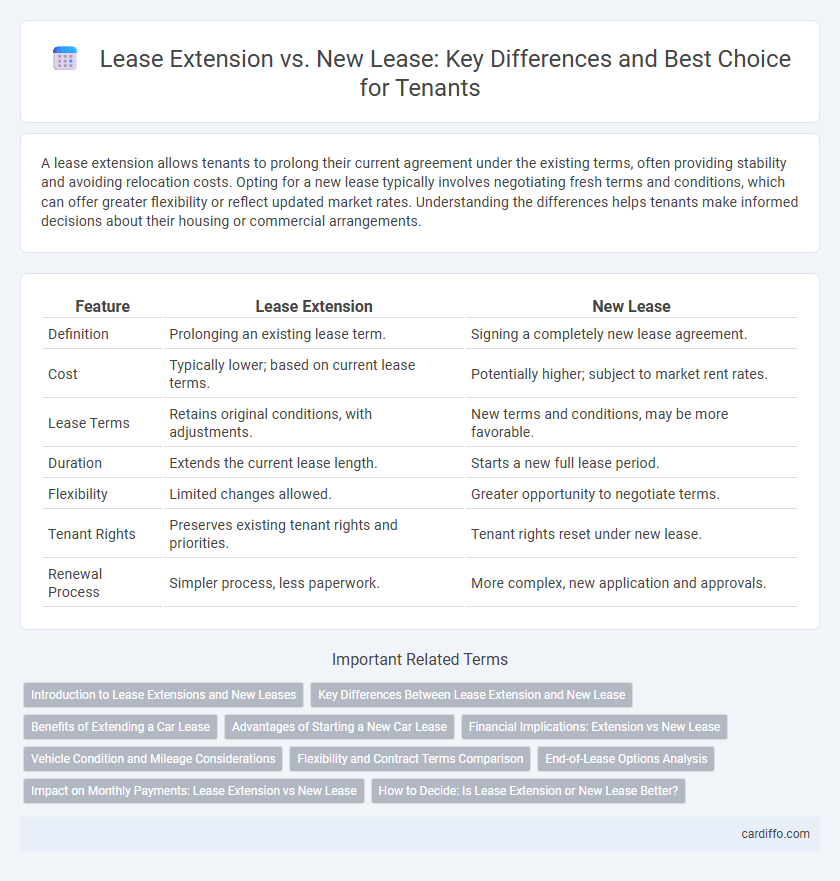A lease extension allows tenants to prolong their current agreement under the existing terms, often providing stability and avoiding relocation costs. Opting for a new lease typically involves negotiating fresh terms and conditions, which can offer greater flexibility or reflect updated market rates. Understanding the differences helps tenants make informed decisions about their housing or commercial arrangements.
Table of Comparison
| Feature | Lease Extension | New Lease |
|---|---|---|
| Definition | Prolonging an existing lease term. | Signing a completely new lease agreement. |
| Cost | Typically lower; based on current lease terms. | Potentially higher; subject to market rent rates. |
| Lease Terms | Retains original conditions, with adjustments. | New terms and conditions, may be more favorable. |
| Duration | Extends the current lease length. | Starts a new full lease period. |
| Flexibility | Limited changes allowed. | Greater opportunity to negotiate terms. |
| Tenant Rights | Preserves existing tenant rights and priorities. | Tenant rights reset under new lease. |
| Renewal Process | Simpler process, less paperwork. | More complex, new application and approvals. |
Introduction to Lease Extensions and New Leases
Lease extensions allow tenants to prolong the existing lease term under the current terms and conditions, providing continuity and avoiding the need for new negotiations. New leases establish fresh agreements with updated terms, often reflecting current market rates and conditions, which can offer more flexibility but may involve higher costs. Understanding the differences between lease extension and new lease is crucial for optimizing long-term property management and financial planning.
Key Differences Between Lease Extension and New Lease
Lease extension allows tenants to prolong the existing lease term, typically preserving current rental terms and conditions, while a new lease establishes a completely fresh agreement, often with revised rent and updated clauses. Lease extensions usually involve shorter negotiation periods and fewer legal formalities compared to new leases, which require full contract drafting and approvals. Key differences include the impact on property valuation, tenant security, and potential adjustment of rent based on market conditions under a new lease.
Benefits of Extending a Car Lease
Extending a car lease offers significant financial savings by avoiding large upfront fees and maintaining lower monthly payments compared to starting a new lease. It provides continuity in vehicle use without the need for credit checks or re-negotiation of terms, ensuring convenience and peace of mind for the lessee. Lease extensions also maximize the remaining value of the existing contract, allowing drivers to enjoy their current vehicle longer without committing to a new depreciation cycle.
Advantages of Starting a New Car Lease
Starting a new car lease provides the advantage of accessing the latest vehicle models equipped with updated technology, safety features, and improved fuel efficiency. It often includes new lease incentives or promotions, potentially lowering monthly payments and reducing upfront costs compared to extending an existing lease. New leases also reset wear-and-tear allowances and mileage limits, minimizing extra charges and offering greater flexibility for drivers.
Financial Implications: Extension vs New Lease
Lease extensions typically involve lower upfront costs and reduced legal fees compared to negotiating a new lease, preserving existing terms while providing continuity. New leases often require higher initial expenses, including deposit, rent premiums, and comprehensive tenant improvements, which can significantly impact cash flow. Evaluating the financial implications of lease extension versus new lease hinges on balancing cost savings against the potential benefits of renegotiated terms and flexibility.
Vehicle Condition and Mileage Considerations
When deciding between a lease extension and a new lease, evaluating the vehicle's current condition and mileage is crucial; a lease extension is ideal if the vehicle maintains good mechanical condition and mileage remains within the allowed limit, avoiding excess wear-and tear fees. Opting for a new lease makes more sense when the vehicle shows significant wear or the mileage limit is approaching, ensuring access to a newer model with updated features and a full warranty. Understanding these factors helps minimize unexpected costs while maintaining vehicle reliability and satisfaction.
Flexibility and Contract Terms Comparison
Lease extension offers greater flexibility by allowing tenants to retain existing terms while negotiating minor adjustments, preserving continuity and minimizing disruptions. In contrast, a new lease provides an opportunity to renegotiate all contract terms, potentially securing more favorable conditions but requiring a comprehensive review and agreement process. Comparing contract terms, lease extensions typically maintain original clauses such as rent escalation and maintenance responsibilities, whereas new leases can redefine these elements to better suit current market conditions and tenant needs.
End-of-Lease Options Analysis
Lease extension provides tenants the benefit of maintaining existing contract terms while negotiating additional time, often resulting in cost savings compared to entering a new lease. A new lease typically involves updated rent rates, potential changes in lease length, and renegotiated clauses, offering flexibility but possibly higher costs. An end-of-lease options analysis should weigh factors such as market rent trends, tenant improvement allowances, and lease renewal incentives to determine the most financially advantageous path.
Impact on Monthly Payments: Lease Extension vs New Lease
Lease extensions typically result in lower monthly payments compared to new leases because they allow renters to spread the remaining balance over a longer term without additional fees. New leases often include upfront costs, such as security deposits and administrative fees, which increase the initial monthly payment amount. Choosing a lease extension can provide more predictable budgeting, while new leases offer opportunities for updated rental terms and potential rent adjustments based on market conditions.
How to Decide: Is Lease Extension or New Lease Better?
Deciding between a lease extension and a new lease depends on factors such as remaining lease length, property value, and future plans. A lease extension is often beneficial when the remaining term is short, preserving property value and avoiding high premiums. Opt for a new lease when negotiating more favorable terms or when major changes to the agreement are needed.
Lease Extension vs New Lease Infographic

 cardiffo.com
cardiffo.com